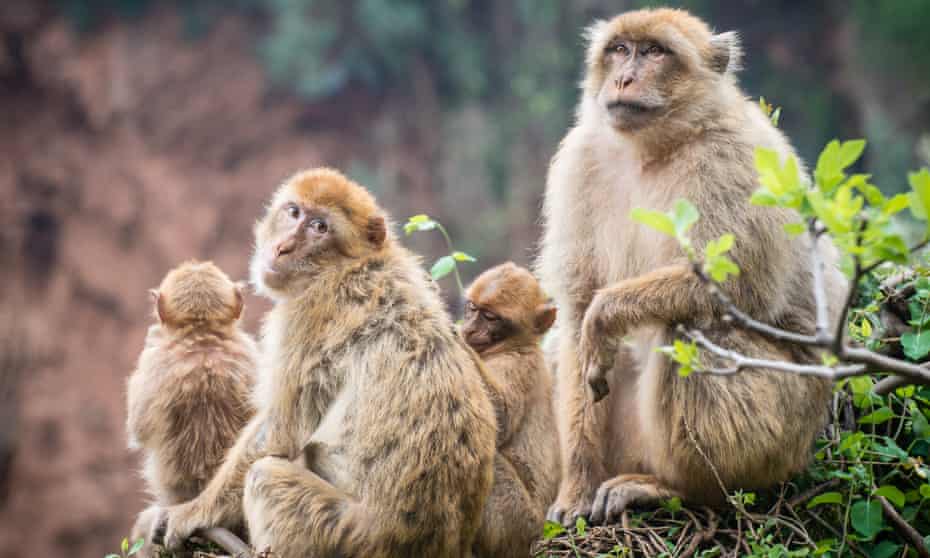From lemurs to spiders, this gleeful exploration of female sexuality in the animal world overturns a host of outdated assumptions

Monkey business … Barbary macaques. Photograph: AJ Withey/GettyJosie GlausiuszFri 11 Mar 2022 07.30 GMTLast modified on Thu 17 Mar 2022 09.18 GMT
In the annals of female animals and their sexual antics, few can match the ferocity of the British fen raft spider, a rare wetland arachnid with a legspan the width of a human hand and an appetite for insects and tadpoles. During courtship, a male will caress a female by vibrating his legs across her body. Then – wham – the female will often grab him, kill him and gorge on her dead mate’s corpse. But in that instant before death, the male may insert his sperm-transferring pedipalp into the female, fertilising hundreds of her eggs even as he is being eaten.
“So his life, although short, achieved its purpose. What’s more, sucking dry her lover’s body may well have nourished the female’s eggs, giving her spiderlings a better chance in life,” writes Lucy Cooke in Bitch, her bold and gripping takedown of the sexist mythology baked into biology.
Offering a wealth of examples ranging from cannibal spiders to sex-switching reef fish, Cooke dismantles a mass of misconceptions about binary sex roles, many of which can be traced back to that beloved bearded icon, Charles Darwin. According to Darwinian dogma, male animals fight one another for possession of females, “perform strange tactics” and mate promiscuously, propelled by a biological imperative to spread their abundant seed. Females are monogamous and passive; they wait patiently for their large, energy-rich eggs to be fertilised by cheap and tiny sperm, then selflessly give their all to their offspring.
Cooke gleefully rebuts many of these assumptions about male dominance and female docility. Only 7% of animal species are sexually monogamous, meaning that throngs of female animals, from Barbary macaques to blue tits, seek sex with numerous partners. (A female lion, for example, can copulate with multiple males up to 100 times a day during oestrus.) Among ring-tailed lemurs of Madagascar and meerkat matriarchs of the Kalahari (which kill their competitors’ babies) females are the authoritarian sex. Female topi antelopes of Kenya’s Maasai Mara grasslands gather in their hundreds to battle with their antlers for the chance of sex with the prime bull. Some mums dote on their offspring, but in two-thirds of fish species, single dads care for their young while females disappear after donating their eggs. Many female animals, from mallard ducks to earwigs, use their complicated vaginal anatomy to dislodge sperm or thwart the path of the penis, and thus control paternity of their offspring.
But old stereotypes stick. Darwin’s theory of evolution by natural selection explains how individuals with adaptive traits are more likely to survive and reproduce. But he was puzzled by certain traits, like the peacock’s tail, that offer no obvious benefit, and are even an obstacle to everyday life. The only purpose of these flamboyant accessories, he reasoned, must be to attract and win the opposite sex.Advertisementhttps://9da4239808b740e28379148dbc5f6738.safeframe.googlesyndication.com/safeframe/1-0-38/html/container.html
Competition for mates, Darwin claimed, was largely the domain of males, almost all of which “have stronger passions” than females. With the rarest exceptions, the female “is less eager than the male … she generally ‘requires to be courted’; she is coy,” he wrote in 1871. “The main problem with this neat binary classification is: it’s wrong,” Cooke writes. “Female animals are just as promiscuous, competitive, aggressive, dominant and dynamic as males.” Decades of research, much of it conducted by female scientists, refutes the Darwinian dichotomy that had dominated the thinking of (mainly male) evolutionary biologists.Cooke describes how an ancient network of genes and sex hormones interact, “to create a mixture of gametes, gonads, genitals, bodies and behaviour that disregard binary expectations.” The African spotted hyena, for example, has an eight-inch clitoris shaped like a penis; she also gets erections. Female bonobo apes pursue sexual bliss (with each other). In dolphins, the clitoris is shaped like a “pair of oversized fleshy burger buns”. Patricia Brennan, a University of Massachusetts evolutionary biologist who collects these giant clitorises, is convinced that female dolphins derive pleasure from sex.
Some animals even glide through multiple switches in sex. The Caribbean chalk bass fish swaps sex up to 20 times pera day. The brain of the clownfish, or anemonefish, starts out as male, and becomes female – a change that may surprise fans of the Disney movie Finding Nemo. Belligerent female anemonefish defend territory while the male cares for their eggs. But if the female is, say, chomped by a barracuda, the male anemonefish will transform into the new dominant female. During transition, the fish has a female brain but male gonads.
Bitch is so full of marvellous surprises about sex roles that I sensed Cooke herself was transformed in its writing. Studying zoology at university, she writes, made her feel like “a sad misfit”, an “egg-maker … doomed to play second fiddle to the sperm-shooters”. But after three years of delving into the dizzy variability of female roles, she feels liberated. Much of the distorted science she had been taught was shaped by the values of a certain kind of man. To change that, she insists, we need more diverse scientists: “a mixture of sexes, sexualities, genders, skin colours, classes, cultures, abilities and ages”. Only then, it seems, will we be able to see the female experience in nature for what it is: “variable, highly plastic”, and refusing “to conform to archaic classifications”.
Josie Glausiusz is a science journalist who writes for Nature, Scientific American, National Geographic and the BBC.
Bitch: A Revolutionary Guide to Sex, Evolution and the Female Animal by Lucy Cooke is published by Doubleday (£20). To support the Guardian and the Observer buy a copy at guardianbookshop.com. Delivery charges may apply.